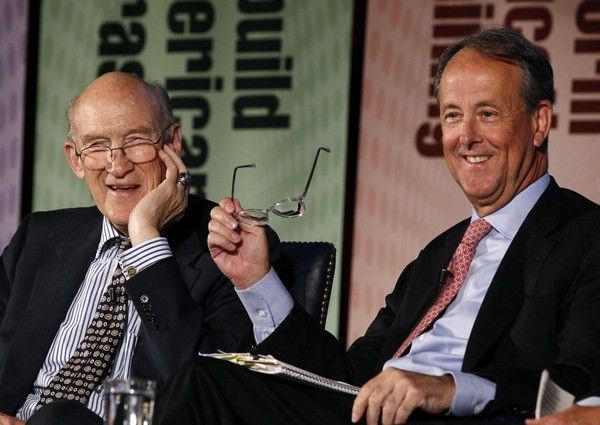Simpson, Bowles: U.S. Debt Deal Inadequate -- Did Congress Miss an Opportunity?

The U.S. debt deal has proved unpopular on all ends of the political spectrum, and it earned two prominent detractors on Wednesday with a critical op-ed piece by Erskine Bowles and Alan Simpson, who led a presidentially-appointed deficit-reduction committee.
The op-ed chastised Congress for not going far enough with its deficit deal, which the authors said "isn't a solution." The Simpson-Bowles commission had outlined a plan to reduce the deficit by $4 trillion compared to the $2.5 trillion savings targeted by Congress, and it advised a balance of Republican priorities like trimming entitlement programs with the new tax revenues sought by Democrats.
The proposal was largely ignored in the partisan rancor dominating the debt talks, despite an abortive attempt by the bipartisan Gang of Six to revive its framework that President Barack Obama embraced. The compromise ultimately adopted by Congress does not explicitly call for any new revenue perceived to be farther to the right than Simpson and Bowles' recommendations.
In their op-ed, Bowles and Simpson renewed their call for a plan that incorporated widescale cuts, generating new revenue by eliminating tax breaks and taking on the explosive costs of programs like Social Security and Medicare. That task will fall largely to a dozen member committee, yet to be formed, that will be responsible for finding some $1.5 trillion in savings by mid-November.
"This country needs a plan to reduce our deficits by no less than $4 trillion in the next decade," they wrote. "It needs a plan to cut more wasteful spending in the defense and nondefense budgets than this deal does. In addition, we must address the unsustainable growth of our entitlement programs and reform the tax code to make it more competitive and more efficient."
The debt deal contains a mechanism that would trigger substantial cuts if the committee fails to strike a compromise, something intended to avert the type of bitter impasse that paralyzed Washington in recent weeks. Many of the measures Simpson and Bowles recommend conflict with deeply entrenched partisan positions -- Democrats have opposed cuts to Social Security and Medicare, while Republicans have adamantly resisted finding new revenue -- something they acknowledge in urging the new committee's members to be "bipartisan and bold."
"[The committee] must resist the temptation to simply recommend the bare minimum necessary to avert the next crisis instead of truly dealing with our long-term fiscal problem," they wrote. "The leaders of Congress must appoint members who will come to the committee with a willingness to reach a principled compromise that puts national interests ahead of partisan ones."
© Copyright IBTimes 2024. All rights reserved.





















